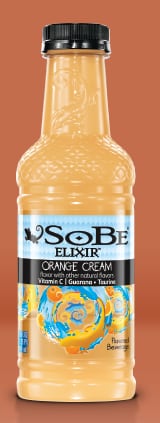Friend of the Earth (FOE) released a report on May 21, ‘Tiny Ingredients, Big Risks’, which warned of a tenfold increase in “unregulated, unlabelled ‘nanofood’ products” over the past six years in the States.
PepsiCo spokesman Jeff Dahncke told BeverageDaily.com that PepsiCo’s SoBe Elixir Orange Cream, cited as a source of nano-sized titanium dioxide (TIO2) in the report, does not even use the FDA-approved beverage brightener and whitener, also called E171 in the EU.
“I checked this and the SoBe product mentioned does not use this ingredient. I’m not sure where Friends of the Earth sourced the information,” Dahncke said.
In a further twist to the saga, the scientist behind the dataset Friends of the Earth says it used - taken from the PEN inventory of consumer products using nanotechnology - says the inventory misrepresented his conclusions in a 2013 study, which found titanium in some drinks but not TIO2.
'Not used in any US Powerade products'
Coca-Cola media relations director Petro Kacur told us internal enquiries led him to the same conclusion. “So far I’ve learned that titanium dioxide is not used in any US Powerade products,” he said.

The double rebuttal follows similar denials from large US dairy firms Dannon, Daisy Brand and Lactalis American Group, who were also cited by FOE, to our sister site DairyReporter.com.
The FOE report calls for a moratorium on further commercial releases of food products, food packaging, food contact materials and agrochemicals that contain nanomaterials until safety and labelling laws are established.
Author Ian Illuminato claims that nanomaterials – of 1,000 nanometers (nm) or less, although the fluid definition and US regulations around it are precisely the problem, he says – are known to be present in 94 products on the market everything from doughnuts to drinks – principally in the form of TIO2.
Peer-reviewed evidence suggests nano harm - FOE
Illuminato says peer-reviewed evidence shows that nanoparticles can harm human health and the environment given factors such as (1) Their higher chemical reactivity and bioactivity than larger particles that may pose toxicity risks (2) Their higher likelihood of entering cells, tissues and organs (3) Risks to the immune system and possible “long term pathological effects”.
Nano-sized titanium dioxide (TIO2) is the main culprit in foods and beverage, according to the report, which claims that “recent studies have indicated that these particles may play an important role in the initiation and exacerbation of gastro-intestinal inflammation, by adsorbing bacterial fragments then carrying them across the gastro-intestinal tract.”
But beverage manufacturers are not required to disclose use of nanomaterials, which Illuminato claims creates “chasm of knowledge” for the public and regulators.
He then cites three sources (a 2006 Innovest report and 2005/6 articles in Forbes and The Guardian) claiming that companies including PepsiCo pursue nanotech R&D to, inter alia, save money on ingredients by producing ingredients with stronger flavors and increasing food and beverage shelf life and nutritional qualities.
Kraft, Unilever and Nestlé also on list
Then comes a list of ‘commercially available nanofoods’ in the US from the likes of Kraft, Unilever and Nestlé, based on Project on Emerging Nanotechnologies’ Consumer Products Inventory (PEN), hosted by the Woodrow Wilson Center, current on February 19 2014.
Of greater interest to us, this also lists Coke’s Lemon Lime Powerade and PepsiCo’s Elixir Orange Cream SoBe as sources of nano-sized titanium dioxide.
Illuminato and FOE caveat this with a disclaimer stating that manufacturers change product formulations and this might not be reflected in the data – which they say is based on a February 2013 study by Weir et la., the ‘Arizona study mentioned below’, adding that they cannot guarantee the nanomaterial content of these foods.
Illuminato told this website that most of the products on the PEN inventory were referenced from a study led by Paul Westerhoff at Arizona State University.
“We are waiting for a statement from them and that will surely help clear up any inaccuracies if necessary,” he said.
“It is possible these companies aren’t aware their products contain nano (for example, TiO2 is often nano but sometimes manufacturers don’t know they are being supplied with the nano version,” he said.
Westerhoff told BeverageDaily.com today: "My group has never claimed Pepsi or Coke products contain TiO2. We measured Titanium (Ti) in some products – but not all Ti is TiO2. I talked with another journalist this week – and it appears the PEN inventory mis-represented our conclusions in our prior ES&T [Environmental Science & Technology Paper] paper.
"We clearly differentiated products that contained TiO2 nano particles from those that contain Ti," he added.
Just how nano is nano? Problems with the definition
Stating that FOE considered ‘nano’ to relate to materials ranging from 1-1,000nm in size, Illuminato said that the definition of nanomaterials was still in flux.
“The US Food and Drug Administration (FDA) uses a definition of 1-1,000nm for drugs and requests information for ingredients less than 1,000nm in size for other products it regulates,” Illuminato said.
“The European Medicines Agency also defines nanotechnology in a size range of less than 1,000nm across,” he added.
Presented with PepsiCo’s denial that it used nano-sized TIO2 in the SoBe product, Illuminato said: “I would ask the companies to substantiate their claims and also reference our size definition of nanomaterials.”
*Article updated to include comment from Paul Westerhoff.
